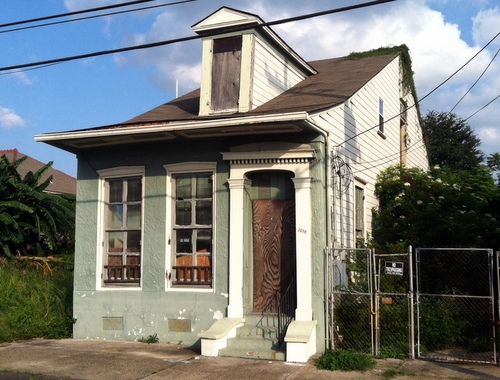
The house at 1016 North Roman in Treme had already been bid to 1 percent halfway through the first day of the three-day auction. (Photo by Jean-Paul Villere for UptownMessenger.com)

Jean-Paul Villere
Whether you realize it or not, now – right now – and through Thursday evening at 8 PM, the almost annual Orleans Parish Tax Sale is taking place via CivicSource.com. It’s a big deal for many reasons, but also it can be rather fascinating if you’re a fan of Crescent City dwellings as well as archaic governmental proceedings. Here’s why: you bid down.
It’s the same dollar amount to all bidders, but you bid down percentage of ownership. Therefore conceivably one willing to purchase 1% of any given property’s tax year(s) becomes the de facto winning bidder and cannot be outbid, however they are settling for the smallest possible amount of ownership. Very New Orleans, right?
Very Louisiana is more accurate. It’s a state guideline. Some say it’s to protect the delinquent to the second or third tier of excisement, because you see, even after you purchase, the titled party possesses and retains the opportunity to redeem for years to come. In short, these tax sales do not behoove the impatient or the faint of heart.
Personally, I don’t see a big difference between 99% and 1% in this matter; you either take the whole enchilada or you don’t. Attorneys that have a taste for these matters will encourage bidders to stick to 100%, and if some one outbids you to 99%, then keep on shopping. One such attorney is Ryan Scafidel of Audubon Title in MidCity.
“Our method is downright tax debtor friendly since the tax sale debtor can sometimes keep up to 99% of the ownership,” he stated by email. “I am not saying it’s the best method, and I know that some legal eagles have had discussions about amending the State Constitution.” In my opinion an amendment isn’t just a druther, it’s an imperative. Why shouldn’t we?
For clarity, this process isn’t wholly about the possibility of taking over property as many investors simply use it as a vehicle to gain a high rate of interest on their money. And hey, if they happen to secure real estate instead then even better.
But let’s talk nuts and bolts here with an example. Say a $100k property with a delinquent tax bill of $500 is up for grabs. You bid 100% for the delinquent tax year, and if no one down bids it to 99% or lower, you pay the $500. Keep in mind, you’re only buying one tax year, and not the entire property per se. At times there will be additional tax years too, so possibly expect that.
But it’s $500 regardless if it’s 1% or 100%, and it’s really only the beginning of the journey should you be the successful bidder as the process is an ongoing one and future tax years must be paid and linear time must pass before any potential possession or claim to title can be formally, legally put into motion.
Do you really want to keep bidding it down against other bidders. 98% to 97% to wherever. Some go straight to the bone and go to 1%. Easily the worst position to be in would be 2% because you can’t outbid someone after they cut you away and they choose 1%. Which is why I think an amendment needs to be queued. The whole process makes little sense and slothly shuffles muddied title around.
Be done with it. Or embrace it. Until the law changes, hold your breath. And if you have the stomach for it, do it. But if you do decide to participate and you do happen to be successful in bidding at whatever percent, do seek the expertise of an seasoned lawyer that can help you navigate these waters. Yes, there’re legal costs there too, but would you rather hire a professional to help on the front end or hire one to help you repair any missteps? I’ll take the former. Happy bidding!
Jean-Paul Villere is the owner of Villere Realty and Du Mois Gallery on Freret Street and a married father of four girls. In addition to his Wednesday column at UptownMessenger.com, he also shares his family’s adventures sometimes via pedicab or bicycle on Facebook, Twitter, and YouTube.
Try wrangling with cases – such as 4121 State St Dr – where proper notice was not given by the City to the former owner, so the tax sale buyer (attorney Allan Borne, Jr.) wound up having to take the matter all the way to the LA Supreme Court, only to LOSE IN 2012. Thus, the abandoned property reverted back to the original owner (who wants nothing to do with it!), but whom the City refuses to identify correctly. Meanwhile, the neighbors have to contend with a dilapidated eyesore falling down around them, and not being maintained by whatever bozos the City hired to keep the place tidy. Talk about a lose-lose situation! Obviously, the City – despite its best intentions – is incapable of moving things to Sheriff’s sale in an expedient manner, and could care less.
So let’s say that you win the auction with a 1% bid on a property and pay a delinquent tax bill of $1000. During the 3 year redemption period you pay the annual taxes on the property (let’s say $3000/year for three years = $9000) The owner never pays off the tax bill, with interest, to the city. Now you are $10,000 invested in this property and have 1% ownership of the property. What does this effectively mean? Do you still hold a lien on the property for the delinquent taxes that you paid? Or is that lien now null and void and you now only own 1% of the property? As 1% owner what are you rights? Can the original owner do anything they please with the property without your knowledge or permission? Are you now responsible for paying 1% of the yearly taxes on the house? If so, and if the taxes aren’t paid, can you now have a lien brought against you? Are you now responsible for 1% of the mortgage? As 1% owner can you legally force the original owner to sell the property? Can you refuse to agree to have the house sold even if the 99% owner wants to sell it? What motivation does the delinquent tax holder have to pay off the lien, if they know that someone else paid off their $10,000 tax bill and will only be granted 1% ownership after the three year redemption period?
Why shouldn’t the method be “downright tax debtor friendly”? The purpose of the tax sales are not to make a property owner lose their property for a tiny percentage of the value for simply being delinquent for a brief period on their property taxes to the city. The purpose is to get the revenue into the city coffers, and allow in the process the winning bidder to get a handsome return on his investment or possibly in several years get a property for the fraction of its actual cost. If the property is redeemed the person who won the auction and paid the taxes is repaid with a very substantial interest rate. These sales are an investment device with no risk to the purchaser, just solid returns.
This 1% problem is not something that used to be common. I’ve been involved in tax auctions for twenty years and this never used to happen. Sure, there have always been investment banks and others looking to get that good 17% return on their investment in the first year, but not to this degree. The problem we face now is that someone is sitting at a computer in Norway bidding on a property that they know nothing about, other than they think it is in a good neighborhood which means that the owner is likely to redeem. Not always the case.
If our council members actually cared about our neighborhoods, they would push the legislature to amend the tax sale process for New Orleans. It’s already too long at three days, but if they want to keep it that way, why not make the first day for only those interested in actually acquiring the properties being auctioned? No bids will be accepted for less than a controllable interest during this period and then the investors can have at it with what’s left after that. Do something.
Some dummy bid 1% on a blighted house that I have been trying to buy for years. It has been sitting vacant since Katrina, has been cited for blight 17 times since (with the owner doing just enough each time to meet the requirements of code enforcement) and now the owner has literally zero incentive to pay her taxes, because someone without a controllable interest in the property did it for her. This means another eighteen months of the property sitting vacant, blighted. The remediation period for her latest blight hearing expires in 9-20, a convenient 8 days after the tax auction ends, and she is still going to have a 99% interest in the property that she refuses to keep up.
By putting it online the city collects more unpaid taxes than they did when it was at the courthouse, which is the end game. But int he process, they are screwing our neighborhoods. We already pay out our asses in property taxes to live in Orleans Parish, but our properties keep declining in value because of a few houses per block that are allowed to be kept in limbo by the backwards structure of things like the tax auction and code enforcement hearing process. (Why does it take nearly a year after a property is inspected to have a hearing for blight?)
The system is broken, and it won’t be changed. But, hey, what else is new?